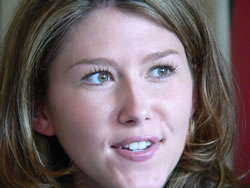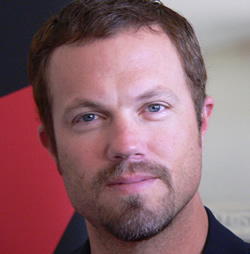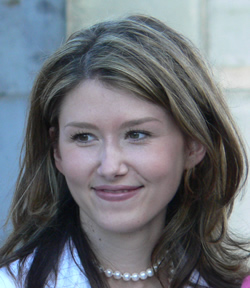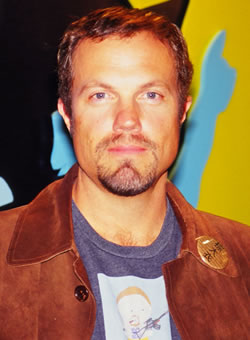 Adam Baldwin, Gina Torres and Jewel Staite talk to Johanna Juntunen about their experiences of working on Serenity, prior to the DVD release.
Adam Baldwin, Gina Torres and Jewel Staite talk to Johanna Juntunen about their experiences of working on Serenity, prior to the DVD release.
What happened in your mind when you found out that the movie was getting made?
JS: I was incredibly happy (laughs) and I didn’t entirely believe it until I was on set with my name on that contract, because it was so heartbreaking when the series got cancelled that I didn’t want to attach myself to anything emotionally until it was a done deal.
GT: Exactly. I was shocked. Even if I thought that it might, could happen, that it was possible if everything was aligned the right way, I certainly didn’t think it would happen as fast as it did, so that was a gift, and shocking and wonderful, and when I got off the floor I was happy (laughs).
 The women are in very prominent and strong roles in Serenity. What did you think about it?
The women are in very prominent and strong roles in Serenity. What did you think about it?
GT: I was happy about it. Clearly when you are looking into the future…as far as we’ve come now, you have women in the trenches now, they are in Iraq and in the work place. If you project that 500 years into the future, of course we are going to be in positions of power and even more capable because we are part of the workforce. As human beings we have to use each other and what we’re best at. And my character Zoe is clearly a fabulous, kick-ass, capable soldier. Why wouldn’t you want that person to be your right hand?
JT: I love that Kaylee is young and fresh and naïve and comes from a small town, a little bit lower class, but when she gets next to an engine she becomes this brilliant, amazing mechanic. It’s fun. It’s hard to say that techno babble, though, it’s not so fun (laughs).
She’s a little sexually repressed too?
JS: Yeah (laughs). She wants some lovin’, there’s nothing wrong with that. She’s a regular girl, she just likes machines. A lot.
“I’m not going to die now”…
JT: I love that, that’s brilliant.
AB: It’s a testament to Joss’s creativity, he loves writing strong women characters, that flows from him. He casts some pretty women too.
Sometimes the dialogue in sci-fi films can be very cliched, it wasn’t the case here. Did you know that it was going to come out as funny as it did?
JS: We got lucky, Joss is such a great writer.
AB: But the sci-fi element is just a setting. You have these nine very strong characters that are able to function or dysfunction on this space ship, and that’s really what’s interesting, for me anyway, just to watch actors struggling to win that conflict. It’s Joss’s writing and we just kind of play and run with it.
GT: And what is so interesting about the writing too, is that he has taken this futuristic world that he has created and all the circumstances that have sort of fed into this world that you see in front of you, and an element of that is what we sort of refer to as ‘Joss speak’. It the English language ever so tweaked enough to make you a little crazy (laughs) as an actor, but it sort of informs everything else surrounding it, so maybe a line that you may have heard before doesn’t sound the same. Because it doesn’t sound the same it holds a different weight, or it resonates differently in the ears, and I think that just makes it more interesting.
AB: He writes with a unique rhythm. If you can key in to that rhythm, you can be successful.
JS: Yeah, once I got used to it, it became really easy. I can’t help myself doing it off set, that broken English he sometimes writes for us.
 That’s a good thing about the movie – it has real dialogue, but what do you think was so special about the series that it had to be made into a feature film?
That’s a good thing about the movie – it has real dialogue, but what do you think was so special about the series that it had to be made into a feature film?
AB: I think there are three elements that I see. One is certainly Joss’s dedication and love for these characters, he really wanted to tell the story. Number two would be his ability to reach out to Universal Studios after the show got cancelled and number three which is very important, is the fan base. The fan base that found the TV show and bought all those DVDs made Universal’s decision that much easier.
What is your interaction with the fans like, especially right after the show got cancelled?
GT: Some were angry (laughs), most of them were sad. They found us early, they were sort of shocked that we disappeared because we were really on the air for 11 episodes and we were pre-empted as often as we aired. We might be on one week and then we wouldn’t be on for two weeks because of the baseball playoffs or whatever it was. They felt like they were teased with the promise of a show that they could be dedicated to and be interested in and see how it played out. And then we were gone as quickly as we appeared. I think that’s what sort of helped with the sales of the DVD, suddenly there was enough talk about it, maybe enough people had seen it but they were just completely dissatisfied and wanted to know what happened. Because it is good story telling, because they are intriguing characters, and you know, how do you feel when you favourite show is cancelled? You feel lost a little bit. Cheers was on the air for 30 years and people still miss that show (laughs). I think we just sort of filled a niche that wasn’t available on television at the time.
Was the moviemaking experience better because you were able to prove the network wrong?
AB: No, no, no. It’s a story of redemption, it really is. Television is hard enough, it’s hard enough to get a show even made, even to get one pilot made. So, we are unique in that we even got on the air, period. Most shows don’t. The fact that it was on for 11 episodes and then got a box set, is…you know, it’s a numbers game. Bottom line, we didn’t get the ratings, but we sold enough DVDs and now we are a major motion picture. That’s a good story. I don’t think there’s another story like that. So, we can’t go into it with vindication and revenge, that’s negative. We have a very positive product here, a wonderful movie we love, and we want to just drive forward with that. You can’t go backwards.
GT: But it is incredibly gratifying to be a part of something that you knew was special from the very beginning that was not understood. There was really no effort, that we could see, to make that happen and then it sort of released to the world and the world responded in the way that it has been…yes, absolutely it’s incredibly vindicating.
JS: I think we were always very proud of what we had and I think that we appreciated it for what it was. So to be here now, we just feel even more pride. The sense of validation…
GT: The sweet sense of validation.
JS: We just all feel a lot of love towards this project.
How was the fight camp for you?
AB: I’ve been at fight camp all my life.
JS: I didn’t have to go to fight camp.
GT: I went for a day (laughs), and that’s mostly because I have a relationship with the stunt coordinator and he knew what I was capable of and it was fine. But most of the action rested on the shoulders and legs and arms of Nathan and Summer.
JS: We rehearsed all day long, the dialogue and the scenes for the first two weeks, and then after that long day of rehearsal Nathan and Summer had to leave to go to fight camp. At the end of a long day on set they had to go to fight camp. I felt sorry for them because I could lounge by the pool after my workday was done and they had to go to get bruised and tired out. But I was a little envious when I saw the final product (laughs). It looks really good. So all their hard work definitely paid off.
 Did you ever feel silly for acting against the green screen because nothing was there?
Did you ever feel silly for acting against the green screen because nothing was there?
JS: I don’t think that I ever felt stupid, but it was definitely difficult to react to things that weren’t there. I remember filming the sequence where we were going through Reaver territory and we were watching the ships out the window, and there’s nothing there except the camera guy with lights, so that was challenging, but as an actor it’s always fun to be challenged and see how that plays out when the special effects are in place.
AB: But there was minimum green screen used here. They had actually animated this whole chase scene where we were going to be as a form of a story board and they had also animated the trucks, the support vehicles behind it, so everyone knew where the positioning was going to be. And that’s what we did first. So it was this very well organized machine in place because we were on a tight budget, relatively speaking for this kind of a film, and it was good and right, and here we go again. Rough cuts are tough to watch sometimes because of the skeletal mock-ups of the space ships look a little like “oh? Well, okay, it’s a rough cut”. But that all got smoothed over.
GT: It’s hard for me to watch myself on screen but because there are so many elements missing when you’re shooting something like this, I’m happy to watch it because I don’t know how it’s going to look when it’s finished. So I’m outside myself being engaged in this world that I participated in but never really saw all of. The end product is great, but when you’re in it, you have to use your childlike imagination (laughs).
How different is the movie from the series?
AB: It’s bigger, grander.
GT: Darker.
JS: A little scarier. The stakes are higher.
AB: The threat of death is really looming over us.
GT: In the series you were pretty sure that they were coming back next week but in the movie you are not sure.
 Adam, was it hard for you to balance the humour but still be the toughest guy on the team?
Adam, was it hard for you to balance the humour but still be the toughest guy on the team?
AB: Jayne is this guy who says what everybody wishes they could say. He’s that big elephant in the room that will just spew the truth and I think people relate to that. My inspiration was really drawn from the shoot-them-up westerns that I grew up watching, like The Wild Bunch and The Good, the Bad and the Ugly, Once Upon a Time in the West and great character actors like Eli Wallach, Jason Robards, guys like that who I modeled Jayne after. But Joss gave me some really fun words to say and I just got to drop my voice like this.
What is your favourite scene or moment in the movie?
AB: My favourite moment is a quirky little moment with River and Simon when he says to River “am I talking to Miranda now?” and she just looks at him like “no, idiot!” But my favourite scene to shoot was that whole initial chase scene on the ‘mule’, that was just great. That’s some of the most fun work I ever had: it was hot, hard, it was great.
GT: My favourite moment is when Serenity comes up on screen and all our names scroll down (laughs) “oh, yes! It is real.” I still get a rush, I still get the smile.
It sounds like you had so much fun during shooting, so there must be some funny moments behind the scenes?
GT: I think it’s probably with other people because I’d see that second camera crew coming and I’d just go off in the other direction (laughs). It was too much. It’s too much pressure. This whole ”special features” on the DVD has sort of spun this…it used to be your ‘on’ between action and cut when you were doing the movie, and now “cut!” comes and here comes the other camera crew. So I’m not in it that much.
Serenity is out on DVD on February 27. Pre-order your copy now from Amazon for £11.99.
Free video Podcast of exclusive Joss Whedon interview in the iTunes Music Store. Available from Monday 20th February.
Read the review here. Win a copy of Serenity on DVD.
